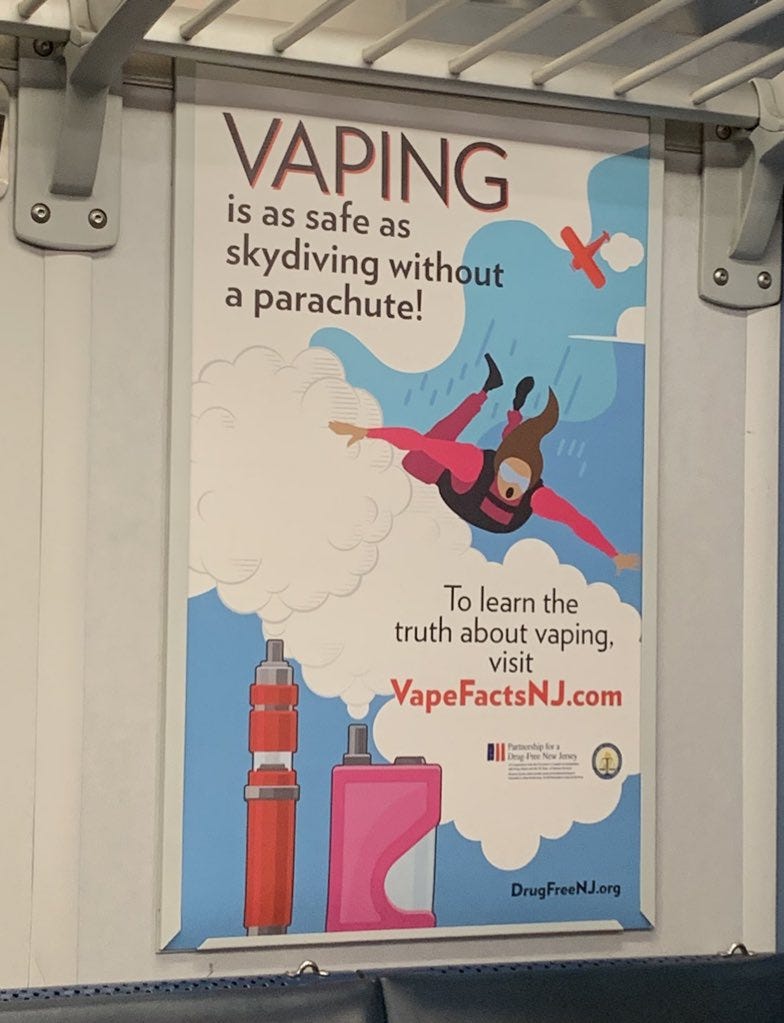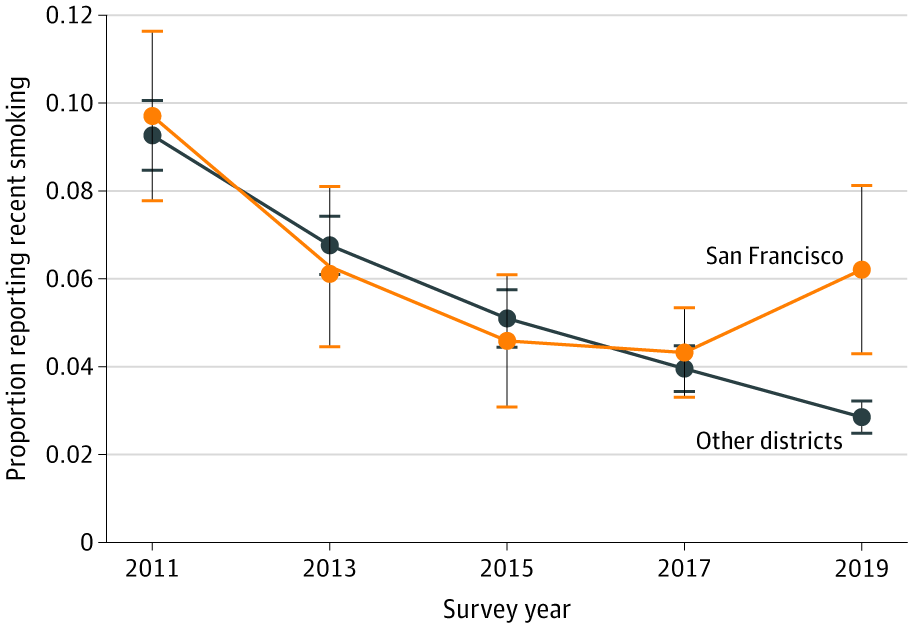The E-Cigarette Summit: “This is just a crazy space right now.”

Marc Gunther
2 days ago·6 min read

The worst vaping poster ever? Photo credit: Danny Giovenco on Twitter
Take a look, please, at this poster from the Partnership for a Drug Free New Jersey, a nonprofit supported by tax dollars. Setting aside the idea of a drug-free New Jersey — presumably, there are no plans to ban alcohol, caffeine and aspirin from the Garden State — the clear implication is that e-cigarettes will kill everyone who tries them. This is so patently false that it is unlikely to deter anyone from vaping. It is, however, an extreme example of how unscientific, distorted and one-sided the debate about vaping has become in the US.
Dominating the conversation are well-funded, politically-influential anti-tobacco groups backed by $160m from Bloomberg Philanthropies and led by the Campaign for Tobacco-Free Kids. Federal and state health authorities, too, strive to keep e-cigarettes away from adults as well as children.
Consumers get one message. “That these products are terrible and you shouldn’t use them,” says Matthew Holman, director of the office of science at the FDA’s Center for Tobacco Products.
Misinformation abounds. “Most adults erroneously believe that vaping is at least as dangerous as smoking,” says Ken Warner, the former dean of the University of Michigan’s public health school.
Scott Sherman, a professor at NYU’s medical school, citing the DrugFreeNJ poster, laments: “This is just a crazy space right now.”
Indeed it is. There is, of course, another side of the vaping story. It’s driven by science that tells us, unsurprisingly, that e-cigarettes will not kill you, at least not right away. While the science is still developing, it increasingly it indicates that e-cigarettes function as a safer (if not entirely safe) alternative to smoking combustible cigarettes and that, if regulated wisely (no easy feat) and allowed to compete in the marketplace, e-cigarettes could save millions of lives.
This week, scientists and regulators who are open to the idea that e-cigarettes can reduce the harm caused by smoking shared their ideas, their findings and, occasionally, their feelings at a two-day virtual gathering, called the E-Cig Summit.
A nuanced message, unheard
These physicians, epidemiologists, economists, lawyers and psychologists generally favor an approach to e-cigarettes that aims to strike a balance between helping today’s smokers to quit while preventing youth from starting to use tobacco or nicotine products.
Their nuanced message is not getting heard. Instead, states and localities are raising taxes on e-cigarettes, limiting access to vapes and banning flavored varieties. In some places, anti-vaping policies may be inadvertently driving more people to smoke.
“Science is what all of us do, and it is what is important to us,” Warner said. “It is clearly not enough.”
One thing that struck me about the E-Cigarette summit was the restraint that speakers displayed in presenting their findings. It was a contrast with some of the claims put forward by Tobacco-Free Kids and the Truth Initiative — groups that Mike Cummings, a professor at the Medical College of South Carolina, pointedly described as “previously respected” public health organizations.
Consider, for example, the question of nicotine, an addictive substance found in conventional and e-cigarettes. Nicotine is not what kills people who smoke. But Tobacco Free California, an anti-vaping government website, scares people by asserting that “Nicotine = Brain Poison.” (Tell that to Einstein and Freud.)
By contrast, at the e-cig conference, Neal Benowitz, a physician who believes that vaping is preferable to smoking, nevertheless acknowledged concerns about the effects of nicotine in e-cigarettes on adolescent brain development and heart disease. He also noted the much remains unknown about the long-term effects of vaping.
Benowitz, a physician, a professor at the University of California at San Francisco and one of the world’s leading experts on nicotine, also noted the long-term effects of vaping remain unknown.“Smoking related diseases usually take many years to develop, and the same is likely true for e-cigarette related disease,” he said.
Similarly, Dr. Jamie Hartmann-Boyce of the UK-based Cochrane Tobacco Addiction Group took care not to overstate the evidence that e-cigarettes can help adults quit smoking. Cochrane’s research, which is widely admired, reviewed 56 clinical trials with more than 12,000 adults who smoked; its researchers came away “moderately confident” that e-cigarettes helped more people to stop smoking than a leading alternative, nicotine replacement therapy. Cochrane is famously careful about the way it presents evidence, recognizing there’s always more to learn. “I worry sometimes that the uncertainty gets jumped on really quickly,” Hartmann-Boyce said.
She has reason to worry. Anti-vaping groups seize on uncertainty, saying, for example, that there is “limited evidence” that e-cigarettes help people quit. This is literally true, but it ignores the existing evidence.
Cliff Douglas, the former vice president for tobacco control at the American Cancer Society, was one of several speakers to call for a truce in the battles over vaping that have fractured the tobacco control community.
“Failure to end the warfare and reinstate the fealty to good science risks millions of additional, premature smoking-related deaths that could otherwise have been prevented,” Douglas said.
A ban on flavored tobacco backfires
The newest and most eye-opening paper presented this week suggests that government efforts to restrict vaping could lead more people to smoke. Writing in JAMA Pediatrics, Abigail Friedman, an assistant professor at the Yale School of Public Health, looked at a ban on all flavored tobacco products that took effect in San Francisco in January, 2019.
Other studies reported that adults aged 18 to 34 cut back on tobacco use after the ban, but Friedman’s study was the first to look at the behavior of high school students. The flavor ban, she wrote, “was associated with increased smoking among minor high school students relative to other school districts.”
Here’s a chart from her study.


“All else equal, restricting ENDS (electronic nicotine delivery systems, or e-cigarettes) access seem to increase tobacco use,” Friedman said.
If true, this is terrible news. Everyone in tobacco control agrees that smoking conventional cigarettes is bad. To her credit, Friedman noted the limits of her study, which took a short-term look at a single city. It’s also not clear whether the high school students were heavy or occasional smokers.
Still, Friedman said: “We should be wary of tackling vaping with all or nothing policies like bans.” Caution is warranted, if only because teen tobacco usage patterns have been distorted lately by the Covid-19 pandemic, the scare about EVALI (which was not caused by e-cigarettes) and the ban on tobacco sales to anyone under 21 enacted by the Trump administration. We don’t know much about what tobacco products teens are using, and why.
Those favoring the approach known as harm reduction — as opposed to outright bans — also pointed to favorable evidence from abroad. Sweden has the lowest smoking rate in Europe because people have turned to snus, an oral smokeless tobacco product. In Japan, the growth of a smokeless tobacco product reduced cigarette sales, a study by the American Cancer Society found.
“There’s a glimmer of hope out there,” said Mike Cummings, the South Carolina professor who has studied tobacco use for decades. “It’s not all gloom and doom. It’s pretty dark in the United States, I have to say.”




